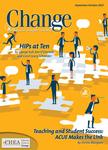版权所有:内蒙古大学图书馆 技术提供:维普资讯• 智图
内蒙古自治区呼和浩特市赛罕区大学西街235号 邮编: 010021

作者机构:Edward J. Balleisen (eballeis@duke.edu) is Vice Provost for Interdisciplinary Studies and Professor of History and Public Policy at Duke University. He is also PI for Duke’s NEH NextGen PhD implementation grant an initiative to help humanities Ph.D. programs rethink doctoral training for the 21st century. Balleisen’s recent books include Fraud: An American History from Barnum to Madoff (2017) and the co-edited interdisciplinary volume Policy Shock: Recalibrating Risk and Regulation after Oil Spills Nuclear Accidents and Financial Crises (2017). Maria LaMonaca Wisdom (maria.wisdom@duke.edu) is Duke Graduate School’s first extra-departmental advisor for humanities Ph.D. students and also Project Director for the NEH-funded program Versatile Humanists at Duke. Previously she was Executive Director for the Institute for the Arts and Humanities at UNC Chapel Hill. Wisdom’s background includes eleven years an English professor at Columbia College in South Carolina she is the author of Masked Atheism: Catholicism and the Secular Victorian Home (2008).
出 版 物:《Change》 (改革;高等教育杂志)
年 卷 期:2018年第50卷第5期
页 面:46页
主 题:GRADUATE education HUMANITIES COOPERATIVE education DOCTORAL students MENTORING
摘 要:Balleisen and Wisdom talk about reform of graduate education in the humanities. Doctoral program reform can and should consider the intellectual formation of students from year one through completion, including helping late-stage doctoral students transition to nonacademic careers. An NEH-funded reform effort at Duke University is developing best practices to support doctoral students: off-campus internships, interdisciplinary collaborative research experiences, and supplemental doctoral program advising. The Duke project suggests practical advice for university administrators, graduate faculty, and graduate students in navigating the landscape of humanities doctoral reform.